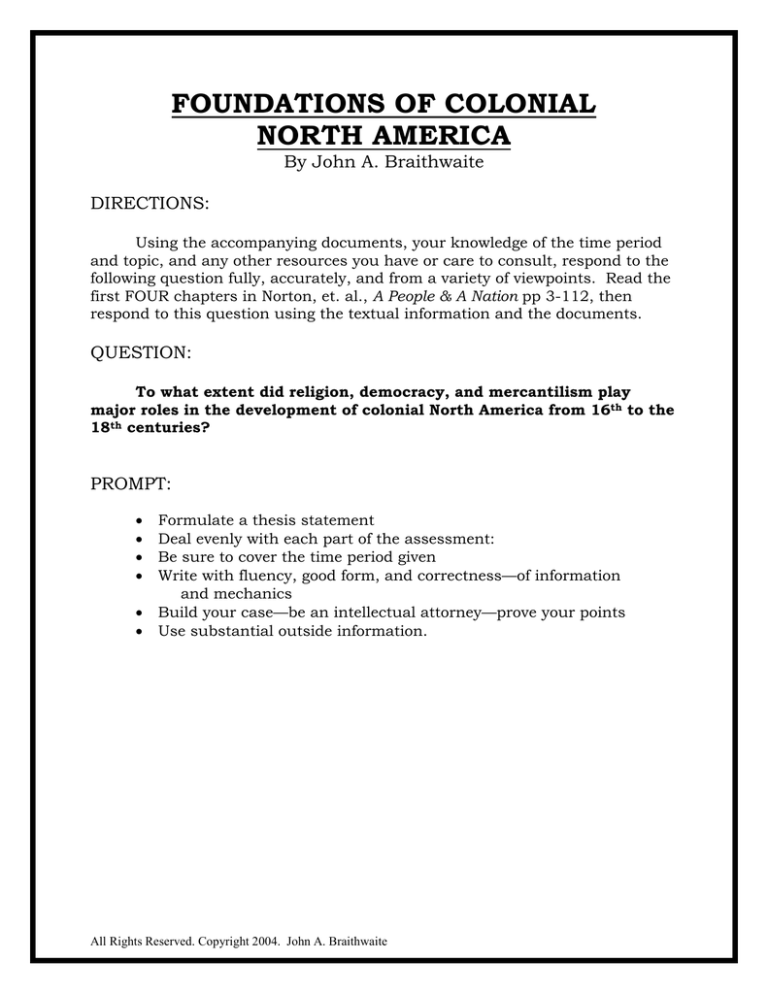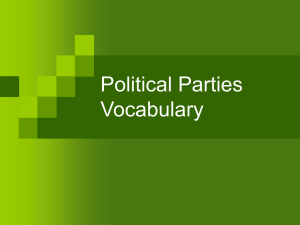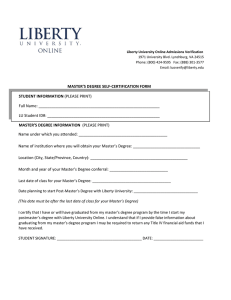
FOUNDATIONS OF COLONIAL
NORTH AMERICA
By John A. Braithwaite
DIRECTIONS:
Using the accompanying documents, your knowledge of the time period
and topic, and any other resources you have or care to consult, respond to the
following question fully, accurately, and from a variety of viewpoints. Read the
first FOUR chapters in Norton, et. al., A People & A Nation pp 3-112, then
respond to this question using the textual information and the documents.
QUESTION:
To what extent did religion, democracy, and mercantilism play
major roles in the development of colonial North America from 16th to the
18th centuries?
PROMPT:
Formulate a thesis statement
Deal evenly with each part of the assessment:
Be sure to cover the time period given
Write with fluency, good form, and correctness—of information
and mechanics
Build your case—be an intellectual attorney—prove your points
Use substantial outside information.
All Rights Reserved. Copyright 2004. John A. Braithwaite
Document A:
Source: Magna Carta, June 15, 1215. As quoted by C. Stephenson, Sources of
English Constitutional History. (New York: Harper and Row, 1937), pp 115-26.
Editorial comment [Stephenson],
While these nobles wanted to protect their own feudal rights, the
document is considered the first major step toward democracy in England. It
established the principle that the king is not above the law.
1.
12.
21.
39.
40
…We have. . .granted to God and by this. . .confirmed, for us
and our heirs forever, that the English Church shall be free
and shall have its rights entire and its liberties inviolate…
Scutage [military tax] or aid [feudal tax] shall be levied in our
kingdom only by the common council of our kingdom..
Earls and barons shall be amerced [fined] only by their peers and
only according to the degree of the misdeed.
No freeman shall be captured or imprisoned or [dispossessed] or
outlawed, or exiled or in any way destroyed…except by the lawful
judgment of his peers or by the will of the land.
To no one will we sell, to one will we deny or delay right and
justice.
Document B:
Source: John Locke, Second Treatise of Civil Government. Old South Leaflets,
No. 208. Boston. Old South Association, n.d.
The state of nature has a law of nature to govern it, which obliges
everyone; and reason which is that law, teaches all mankind. . .that being all
equal and independent, no one ought to harm another in his life, liberty, or
possessions . . . Men being, as has been said, by nature all free, equal, and
independent, no one can be put out of this estate and subjected to the political
power of another without his own consent…
The supreme power cannot take from any man any part of his property
without his own consent . . .
These are the bounds which. . .society, and the law of God and Nature,
have set to the legislative power of every commonwealth…
First, they are to govern by. . . established laws, not to be varied in
particular cases, but to have one rule for the rich and poor. . .
Secondly, these laws ought to be designed for no other end. . . but the
good of the people.
Thirdly, they must not raise taxes on the property of the people without
the consent of the people. . .
Whenever the legislators endeavor to take away and destroy the property
of the people, or to reduce them to slavery. . .they put themselves in a state of
war with the people. . .
All Rights Reserved. Copyright 2004. John A. Braithwaite
Document C:
Source: The Mayflower Compact. November 11, 1620
. . . We whose names are underwritten. . . Having undertaken, for the Glory of
God and Advancement of the Christian Faith, and the Honour of our King and
Country, a Voyage to plant the first colony in the northern part of Virginia, do
by these presents solemnly and mutually in the prescience of God, and one of
another, covenant and combine ourselves together into a civil body politic for
our better ordering and preservation and furtherance of the ends aforesaid;
and by virtue here of, to enact, constitute, and frame such just and equal laws,
ordinances, acts, constitutions, and offices from time to time, as shall be
thought most meet and convenient for the general good of the colony unto
which we promise all due submission and obedience. In witness whereof we
have hereunto subscribed our names at Cape Cod the eleventh of November, in
the reign of our Sovereign Lord King James. . .the fifty-fourth Anno Domini,
1620.
Document D:
Source: Fundamental Orders of Connecticut. January 14, 1639. As quoted in
Bernard Feder, Viewpoints: USA. p.6.
. . . we the inhabitants and residents of Windsor, Hartford, and Wethersfield. . .
well knowing where a people are gathered together the word of God requires
that to maintain the peace and union of such a people there should be an
orderly and decent government established according to God. . . do therefore
associate . . . ourselves to be as one public state or commonwealth; and do for
ourselves and our successors. . . enter into one combination and confederation
together, to maintain and preserved the liberty and purity of the gospel of our
Lord Jesus. . . and also in our civil affairs to be guided and governed according
to such laws, rules, orders, and decrees as shall be made, ordered and decreed,
as follows:
1.
2.
3.
It is ordered, sentenced, and decreed that there shall be yearly two
general assemblies or courts. . .
It is ordered. . . that no person be chosen governor above once in
two years.
It is ordered. . .that when any general court. . . has agreed upon. . . any
sum of money to be levied upon the several towns with in this
jurisdiction. . .a committee be chosen to set out and appoint what shall
be the proportion of every town to pay of the said levy, provided that the
committees be made up of an equal number out of each town.
All Rights Reserved. Copyright 2004. John A. Braithwaite
Document E:
Source: John Winthrop, The History of New England. Boston: 1853, II, p281.
Even so, brethren, it will be between you and your magistrates. If you stand
for your natural corrupt liberties, and will do what is good in your own eyes,
you will not endure the least weight of authority, but will murmur, and oppose,
and be always striving to shake off that yoke. But if you will be satisfied to
enjoy such civil and liberties, such as Christ allows you, then will you quietly
and cheerfully submit unto that authority which is set over you, in all the
administrations of it, for your good. Wherein if we fail at any time, we hope we
shall be willing (by God’s assistance) to hearken to good advice from any of you,
or in any other way of God. So shall your liberties be preserved, in upholding
the honor and power of authority amongst you.
Document F:
Source: “The Bloody Tenant of Persecution for Cause of Conscience.” 1644. By
Roger Williams of Rhode Island.
First. That the blood of so many hundred thousands souls of Protestants and
Papists, split in the wars of present and former ages, for their respective
consciences, is not required nor accepted by Jesus Christ, the Prince of
Peace.
Sixth. It is the will and command of God that a permission of the most pagan,
Jewish, Turkish, or anti-Christian consciences and worships be granted
to all men in all nations and countries. . .
Eighth: God requires not a uniformity of religion to be enacted and enforced in
any civil state. . .enforced uniformity. . .is the greatest occasion of civil
war, ravishing of conscience, persecution of Christ Jesus in his servants,
and of the hypocrisy and destruction of millions of soul.
Twelfth. Lastly, true civility and Christianity may both flourish in a state or
kingdom, not withstanding the permission of divers and contrary
consciences, either of Jew or Gentile. . . . the government of the civil
magistrate extends no further than over the bodies and goods of their
subjects, not over their souls, and therefore they may not undertake to
give laws unto the souls and consciences of men. . . .the Church of
Christ does not use the arm of secular power to compel men to the true
profession of the truth, for this is to be done with spiritual weapons,
whereby Christians are to be exhorted and not compelled.
All Rights Reserved. Copyright 2004. John A. Braithwaite
Document G:
Records of the Town of Newark, New Jersey Historical Society Collection,
Newark. 1864, VI, 3 ff.
At a meeting touching the indented design of many of the inhabitants of
Branford, the following was subscribed:
1st that none shall be admitted freemen or free burgesses within our town upon
River in the Province of New Jersey, but such planters as are members of some
or other of the Congregational Churches nor shall any but such be chosen to
magistracy or to carry on any part of civil judicature, or as deputies or
assistants, to have power to vote in establishing laws, and making or repealing
them . . . Nor shall any but such church members have any vote in any such
elections; thought all others admitted to be planters have right to their proper
inheritances, and do and shall enjoy all other civil liberties, according to all
laws,
orders, grants which are, or hereafter shall be made for this town…
Document H:
Source: Livingston Rutherford, John Peter Zenger, His Press, His Trial.
It is agreed upon by all men that this is a reign of liberty, and while men
keep within the bounds of truth, I hope they may with safety both speak and
write their sentiments of the conduct of men in power—I mean of that part of
their conduct only which affects the liberty or property of the people. . .
Were this to be denied, then the next step may make them slaves. For what
notions can be entertained of slavery beyond that of suffering the greatest
injuries and oppressions without the liberty of complaining. . .
The question before the court and you, gentlemen of the jury, in not of small
nor private concern, it is not the cause of a poor printer, nor of New York alone,
which you are now trying. No! It may in its consequence affect every freeman
that lives under a British government on the main of America. . . It is the cause
of liberty. . . by an impartial and uncorrupted verdict [you will] have laid a
noble foundation for securing to ourselves, our posterity, and our neighbors,
that to which nature and the laws of our country have given us a right—the
liberty, both exposing and opposing arbitrary power. . . by speaking and writing
truth.
All Rights Reserved. Copyright 2004. John A. Braithwaite
Document I:
Source: Gillon & Matson, The American Experiment: A History of the United
States. (New York: Houghton Mifflin, 2002), pp 92-93.
Spain, the preeminent colonial power in the 1500s, set the model for imperial
economic policy that other nations would follow.
English merchants sought extensive government intervention in the economy
to protect now one, now another rising economic interest. Their thinking
known (and criticized) as mercantilism, the term used in 1776 by the famous
Scottish political economist Adam Smith.
. . .Within the nation, mercantilists said, inhabitants needed a wise government
to harness production, to curb the greedy and destructive tendencies of
competition, and to promote and channel the exchange of goods through
regulation.
By the late 1600s, many mercantilists believed that wealth was not
necessarily finite, but that expanding commerce with far-flung peoples helped
create strong empires. A commercial empire they wrote, should have one
center from which flowed finished goods and many widely distributed satellites
that consumed the center’s manufactures and sent back raw materials for
additional production in the “home country.”
Document J:
Source:D. Pickering, ed. Statutes at Large (1762-1-11807), 7:452-454, 459-460.
Navigation Act of 1660
For the increase of shipping and encouragement of the navigation of this nation
wherein, under the good providence and protection of God, the wealth, safety,
and strength of this kingdom is so much concerned;… (2) be it enacted. . . from
thence forward, no goods or commodities whatsoever shall be imported into or
exported out of any lands, islands, plantations, or territories to his Majesty
belonging or in his possession. . . .in Asia, Africa, or America in any other
ships, vessel or vessels whatsoever, but in such ships or vessels as do. . .
belong only to the people of England or Ireland, dominion of Wales. . . or are of
the build of and belonging to any the said lands, islands, plantations, or
territories, as the proprietors and right owner thereof, and whereof the master
and three fourths of the mariners at least are English.
XVIII.
And it is further enacted. . .that. . .no sugars, tobacco, cotton-wool,
indigoes, ginger rustic, or other dyeing wood, of the growth, production, or
manufacture of any English plantation in America, Asia, or Africa, shall be . .
.transported from any of the said English plantations as do belong to his
Majesty . . ..
All Rights Reserved. Copyright 2004. John A. Braithwaite





